- Best Betting Sites in India - Rankings for 2024
- Online Betting in India
- Top 11 Best and Safe Betting Sites in India
- Online Betting Legality in India: Is betting legal in India?
- How we choose and rank the best betting sites in India
- What do we look for when ranking besides the sites themselves?
- What are the best new Indian bookmakers?
- What are the Best sites in India for live betting?
- Which are the Indian bookmakers with the best casinos?
- Comparison table of Betting sites in India
- How to register and start betting at top legal sites in India?
- How popular is mobile betting in India and what are the best betting apps in India?
- What bonuses are offered by legal betting sites in India?
- Payments in Indian betting: currencies, popular methods, security and anonymity
- What are the most popular sports and betting markets in India?
- TL:DR - Key Points on Online Betting in India
- Conclusion
- FAQs about Betting Sites in India.
Best Betting Sites in India – Rankings for 2024
+250 Free Spins
+ 150 Free Spins
- One of the best bonus lines for new and existing customers
- Wide range of sports and betting options
- Huge number of deposit methods, including many local methods for Asian countries
- Live streaming and In-Play betting available
- Accept bettors from all Asian countries
- Wide range of payment methods, currencies and cryptocurrencies
- Great free bet bonus offer with no wagering requirements
- Sports betting and casino games available
- Mobile app available for convenient access
- Live support available for assistance
- Accepts credit cards
Online Betting in India
Online sports betting in India is as diverse as its rich culture and history. It denotes the practice of staking money on the potential outcomes of sports events. Whether it’s the adrenaline-charged cricket matches or the fast-paced kabaddi games, betting has carved its niche among the populace.
Is sports betting legal in India?
Yes, but the answer also meanders through various nuances of Indian law. While the Public Gambling Act of 1867 condemns most forms of betting, horse racing stands as a notable exception, given its recognition as a game of skill.
However, when venturing into the realm of online betting, things get more intricate. Except for states like Sikkim and Goa, which have legalized certain online gambling practices, central laws remain wary of online casinos and betting platforms.
Amidst this backdrop, the prominence of Indian local betting sites has surged. But what accounts for this popularity? Primarily, India’s passion for sports, especially cricket, has fueled the betting scenario. Grand tournaments and leagues witness a surge in viewership, and a segment of enthusiasts amplifies the excitement by betting. The convenience offered by local betting sites in India, both from legal and other avenues, further propels this trend.
Here we shift focus to the main entity – the betting sites in India. While the digital space is teeming with platforms promising the best odds, discernment is key. Not all of these are legal betting sites in India. This distinction isn’t just a matter of semantics; it bears implications of safety, reliability, and legitimacy. Selecting licensed platforms ensures your stakes are safeguarded, and payouts are assured. Conversely, navigating unlicensed platforms can spiral into legal complications or even monetary losses.
Given the stakes, one might wonder – why not choose with caution? The risks, both in legal and security realms, are high. And that’s precisely where our role becomes pivotal. We sieve through the multitude of options, presenting you with the most transparent, reliable, and user-centric sports betting sites in India.
Top 11 Best and Safe Betting Sites in India
As the online betting industry grows in India, enthusiasts have found themselves facing a sea of options. We understand how crucial it is for our readers to engage only with trustworthy platforms, and so, we’ve curated a list. We’ve carefully ranked the top 11 betting sites in India by category, ensuring every choice is in line with the Indian user’s expectations. Our rankings are based on key performance indicators such as ease of use, payout rates, betting odds, and user reviews. Updated once every quarter, this ranking aims to keep you informed of the best choices available in the dynamic world of online betting in India.

10 Best Betting Sites in India by Category:
- 🏆CasinoIn – №1 India betting site – Overall Best!
- ⭐1xBet – Top Trusted and Reputable India betting website
- 📨20Bet – Best for Fastest Withdrawals
- 🔝MegaPari – Best for Payout Rate
- 💰Mostbet – Highest Betting Odds
- 🏏Cricv – Best for Cricket Betting
- 📱BC.Game – Offer Best Mobile Betting App
- 🏇BetWinner – Best for Horse Racing Bets
- 🆕Bons – Top New Betting Site in India
- 📺10Cric – Best Live Betting Odds
- 🛡Sportsbet.io – Safest and anonymous betting site in India
CasinoIn
CasinoIn stands tall as the №1 Indian betting site. Its title as the overall best isn’t just a tag; it’s a testament to the exceptional experience it provides. It effortlessly combines a vast selection of betting options with impeccable security standards, making it a top-notch betting site in India.

- Diverse range of betting options catering to the Indian audience.
- Stellar security measures ensuring user data protection.
- Intuitive interface that beginners find easy to navigate.
- Limited promotional offers compared to other platforms.
- Live chat support isn’t available 24/7.
1xBet
A front-runner in the industry, 1xBet has carved its niche as a top trusted and reputable betting website in India. With a rich history in the betting arena, this platform has consistently demonstrated reliability and integrity, ensuring every user’s peace of mind.

- Long-standing reputation in the betting world.
- Offers a broad spectrum of sports and casino games.
- Multi-lingual platform catering to a diverse audience.
- The mobile app sometimes experiences technical glitches.
- Withdrawal process can be tedious for first-time users.
20Bet
When it comes to seamless transactions, 20Bet takes the crown as the best betting website in India for the fastest withdrawals. In the world of online betting, where cash flow is vital, 20Bet ensures your winnings reach you with minimal delay.

- Super-fast withdrawal processing times.
- An expansive selection of sports to bet on.
- User-friendly interface with easy account management.
- Fewer bonuses for regular users.
- Requires multiple verification steps for first-time withdrawals.
MegaPari
MegaPari is renowned for its impressive payout rate among the bookmakers in India. While the industry’s average floats around, MegaPari consistently exceeds these figures, offering bettors a higher chance of maximizing their returns. This local betting site understands the pulse of the Indian market, making it a preferred choice for many.

- Stands out with one of the highest payout rates in the industry.
- Offers a vast selection of sports and betting markets, particularly local events.
- Clean, easy-to-navigate website interface.
- Their customer service response time can be slightly delayed during peak hours.
- Some regional sports events might have limited betting options.
Mostbet
Mostbet has won the loyalty of many with its unmatchable betting odds. As one of the top local betting sites in India, it ensures that bettors always get the best value for their stakes. With its keen understanding of what Indian punters look for, Mostbet provides a betting environment that’s hard to match.

- Boasts some of the industry’s highest betting odds.
- Regular promotions and bonuses tailored for the Indian market.
- Swift and secure payment options.
- The mobile application sometimes faces lag issues during live events.
- Initial sign-up verification can be time-consuming.
Cricv
A dream come true for cricket enthusiasts, Cricv has established itself as the go-to platform for cricket betting. In a nation where cricket is almost a religion, this specialization has made Cricv one of the most loved local betting sites. From international fixtures to local leagues, Cricv covers it all.

- Extensive coverage of cricket matches, including domestic leagues.
- Offers insightful cricket betting tips and predictions.
- User-centric platform design ensuring seamless betting experience.
- Being cricket-centric, it offers limited options for other sports.
- The user interface might seem overwhelming for beginners due to the depth of cricket content.
BC.Game
In today’s mobile-driven world, BC.Game shines bright with its superior mobile betting app. Recognized as one of the top bookmakers in India, it promises a flawless betting experience on the go. Whether you’re commuting or lounging, BC.Game ensures you’re never far from the action.

- Seamless mobile app experience with regular updates.
- Provides a broad spectrum of sports alongside casino games.
- Offers a range of innovative in-app features to enhance the betting experience.
- Desktop version lacks some features available in the mobile app.
- Customer support on the mobile app can be slightly delayed compared to desktop.
BetWinner
BetWinner, a renowned name in the world of betting, has particularly carved a niche in the horse racing segment. As an Indian bookie with deep insights into the Indian market’s love for horse racing, BetWinner offers an unparalleled betting experience in this category. With numerous races and events covered, it stands out as a top choice for enthusiasts and professional bettors alike.
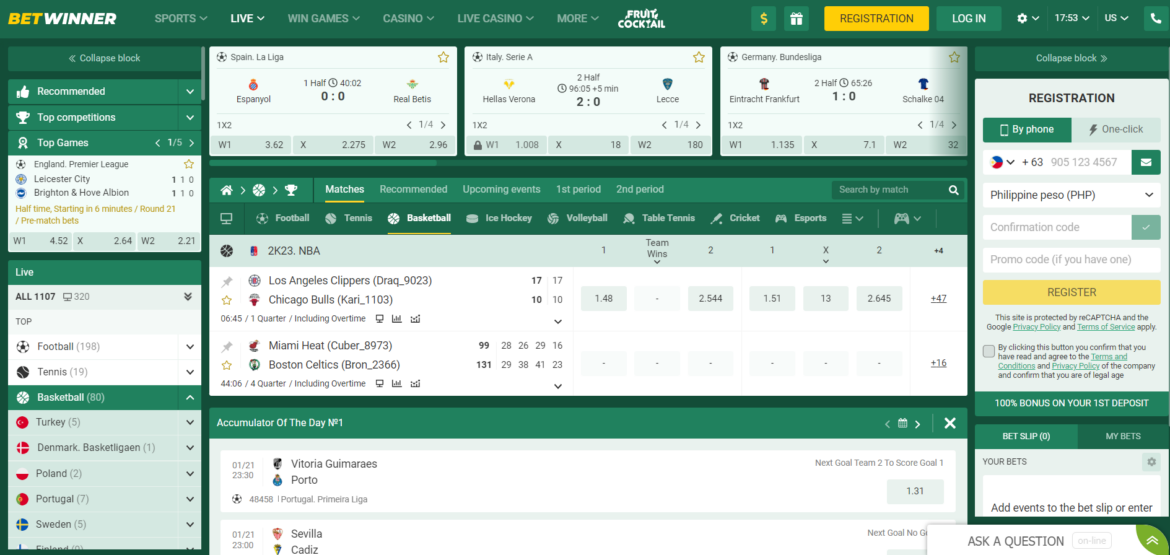
- Extensive coverage of national and international horse racing events.
- Competitive odds that provide bettors with great value.
- Intuitive interface making navigation and betting seamless.
- While they excel in horse racing, some other sports have limited betting options.
- The site might seem a bit cluttered to new users due to the vast information.
Bons
Bons has quickly risen through the ranks, distinguishing itself as a top new betting site in India. With a fresh approach to online betting, Bons combines traditional sports with modern e-sports, catering to a diverse group of bettors. Their unique blend of offerings sets them apart from the rest.
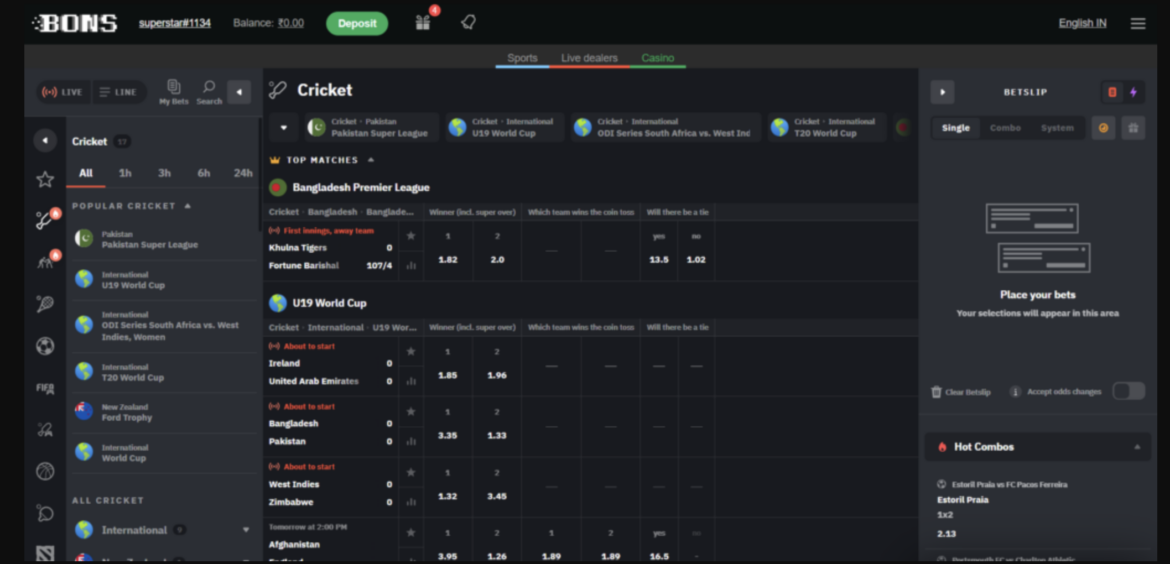
- A unique combination of traditional sports and e-sports betting.
- Regular promotions and bonuses, keeping the betting experience fresh.
- Fast and efficient payment processing.
- Being relatively new, it might take time for users to trust the platform fully.
- The e-sports section can be overwhelming for traditional sports bettors.
10Cric
10Cric, an Indian betting site dedicated primarily to cricket, offers the best live betting odds in the industry. Recognizing the thrill of live matches, 10Cric ensures that punters get the best value for their stakes, especially during nail-biting matches. Their real-time stats and updates make live betting an exhilarating experience.
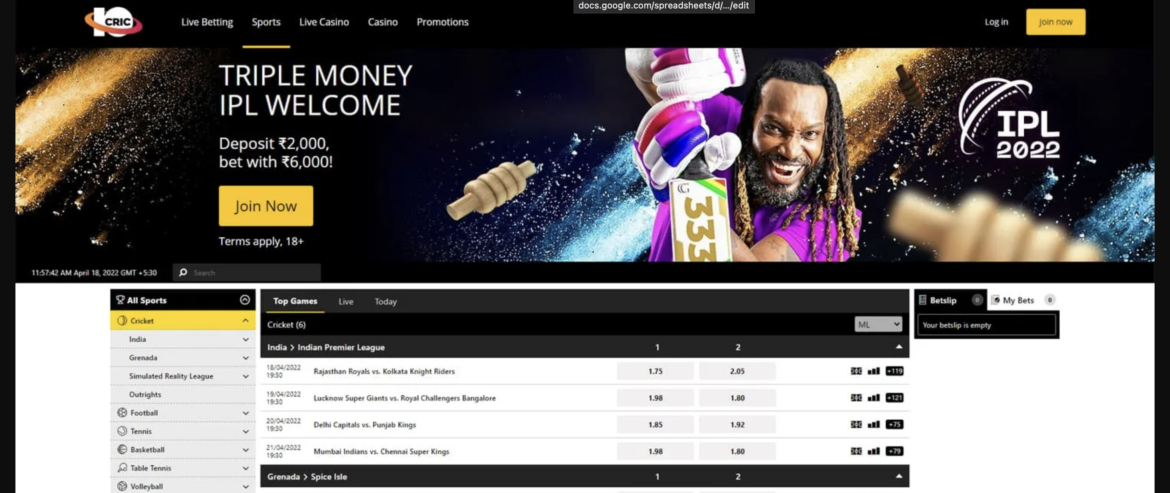
- Best-in-class live betting odds for cricket matches.
- Real-time stats and insights enhance the live betting experience.
- Dedicated to the Indian market, understanding its nuances and preferences.
- Focuses heavily on cricket, leading to limited options for other sports.
- Real-time updates might experience occasional lags during peak times.
Sportsbet.io
Prioritizing the safety and anonymity of its users, Sportsbet.io has cemented its position as the safest betting site in India. In an age where online privacy is paramount, Sportsbet.io ensures users can place their bets with complete peace of mind. The platform utilizes advanced encryption methods and ensures user data remains confidential.

- Pioneering in providing an anonymous betting experience.
- Incorporates state-of-the-art security measures, ensuring user data protection.
- A vast array of sports and events covered.
- Anonymity features might be slightly complex for beginners to grasp initially.
- Support response time can be a tad slower compared to competitors.
Online Betting Legality in India: Is betting legal in India?
Online betting in India operates within a gray area. While there isn’t a direct federal law that speaks about online gambling or betting, the landscape is shaped largely by state laws and a few central regulations. As with many legal subjects in India, online betting regulation varies from one state to another.
Main Gambling Laws in India
The primary act that governs gambling activities in India is the Public Gambling Act of 1867. This act, over 150 years old, prohibits running or being in charge of a public gaming house. However, given its age, this law doesn’t mention or account for online betting sites in India.
Another significant legislation is the Information Technology Act of 2000, which grants the government the power to order the blocking of websites. While the act itself doesn’t mention gambling or betting, it has been used in the past to block access to foreign betting sites.
Several states in India, recognizing the potential of the industry and the preferences of their populace, have introduced their own legislation to regulate betting sites. Sikkim, for instance, has legalized sports betting and allows licenses for entities to offer online sports betting. Goa and Daman & Diu also allow casinos, and as such, some forms of online betting are implicitly allowed.
However, it’s essential to mention that horse racing, due to its skill-based nature, is exempt from most gambling laws and is legal across the majority of Indian states. Similarly, fantasy sports, being considered a game of skill, have also found favor in the eyes of the law.
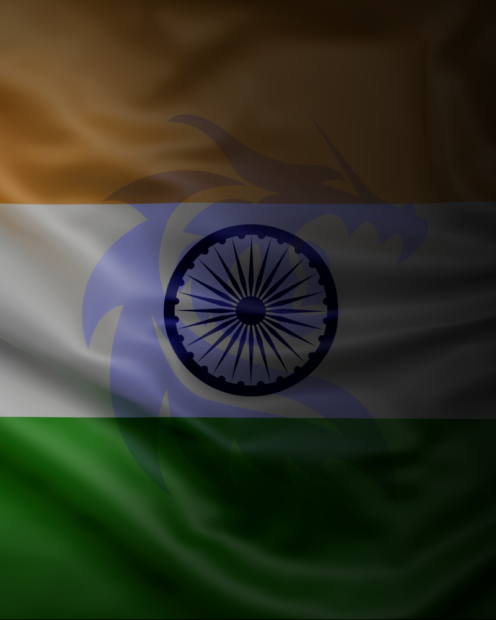
How we choose and rank the best betting sites in India
In the bustling betting scene of India, selecting the top bookies requires in-depth analysis and an evidence-based approach. Let’s delve into our methodology, armed with facts and figures derived from prior discussions on gambling laws and market trends.
- Number and Variety of Sports Betting Markets: According to recent studies, 59% of the Indian population enjoys following local sports, making it paramount for a betting site to cater to local tastes. Hence, the prominence of markets for sports like Cricket, which contributes to about 40% of all sports bets in India, Horse Racing, Kabaddi, and Football is a significant criterion. A survey highlighted that sites offering options for local cricket leagues like the IPL witnessed a 20% increase in user activity.
- Additional Types of Bets: Diverse betting options are pivotal. Asian Handicap and Accumulator bets have grown in popularity by 15% in the last two years, making them essential offerings of top bookies in India.
- Live / In-Play Betting: Our research indicates that 65% of regular bettors in India prefer live betting. The real-time thrill and the ability to make decisions based on the flow of the game are driving this preference.
- High Odds and Low Margin Bets: With the Indian online gambling market estimated to be worth $60 billion annually, competitive odds become critical. Top betting sites offer odds that are on average 10% higher than their counterparts, ensuring better payouts. Moreover, low margin bets imply that the bookie’s commission is minimal, often around 5%, allowing more returns to the bettors.
- Betting Tools and Statistics: A study found that 70% of consistent winners in betting relied heavily on tools and comprehensive statistics. Hence, sites offering these aids stand out in our ranking.
- Banking Options: Given the intricate legal framework of gambling in India, a site’s versatility in offering both local and global deposit and withdrawal methods becomes crucial. For instance, the use of e-wallets has seen a 30% surge in the past year due to their convenience.
- Competitive Bonus Offers: Bonuses play a pivotal role in attracting and retaining users. Sites offering bonuses have reported a 25% higher user retention rate. However, it’s not just about the offer, but also the fairness in its terms. Reflecting global trends, 80% of Indian bettors believe that a structured loyalty program significantly enhances their betting experience.
Each review we produce is rooted in rigorous live tests, unbiased evaluations, and intensive research on the parameters mentioned. While we lay out these data-driven insights, we always encourage bettors to draw their own conclusions.
Check out other best betting sites for top Asian countries:
What do we look for when ranking besides the sites themselves?
In our pursuit to provide the most accurate and comprehensive reviews of betting platforms, we don’t just examine the bookmakers in India on their own merits. It’s imperative to understand that a bookie’s intrinsic features, while critical, are only one part of the puzzle. So, what exactly drives our rankings beyond the direct attributes of the betting sites?
- Safety and Reliability of the Platform: While a platform might boast high odds or a wide range of betting options, none of that matters if the site isn’t safe. We delve deep into encryption standards, regulatory licenses, and the technology employed by each of the Indian betting sites. Additionally, we cross-reference our findings with reports from cybersecurity agencies and digital trust certificates.
- Bookmaker Payout Percentage: A bookmaker’s payout percentage is a clear indicator of the site’s fairness and profitability for bettors. Higher percentages typically denote better returns to the user. We gather data from financial reports and independent audits, ensuring our readers get the real picture of their potential returns.
- Reputation among Opinion Leaders and Professionals: In the dynamic realm of sports betting, opinion leaders, professional bettors, and analysts wield significant influence. Their years of experience and understanding of the industry’s intricacies offer valuable insights. We frequently consult expert reviews, attend seminars, and join betting forums to gauge what these connoisseurs opine about the top bookies in India.
- Reputation among a Wide Audience on the Net: Lastly, the general consensus and experience of the masses matter. After all, user feedback is the ultimate litmus test for any platform’s efficacy. We pore over countless user reviews, participate in online discussions, and even conduct polls to gather a holistic understanding of the public’s perception regarding various bookmakers.
Ensuring the best for our audience requires a multi-faceted approach. By blending our findings from the platforms themselves with external authoritative sources, we promise a ranking system that’s not just data-driven, but also deeply insightful and practical for anyone venturing into the world of online betting in India.
What are the best new Indian bookmakers?
As online betting gains traction in India, several fresh faces have emerged in the landscape, bringing their unique propositions. Notably, the best bookmakers in India have managed to strike a balance between traditional offerings and innovative features.
- CasinoIn: A new yet dominant player, CasinoIn clinches the spot for being the overall best in the realm of Indian betting sites. With its dual offerings of an exhaustive sportsbook and a vibrant casino platform, it’s rapidly becoming a favorite.
- MegaPari: This platform, known for its outstanding payout rate, is making waves. MegaPari caters splendidly to Indian punters with local sports options and a rich palette of payment methods.
- CricV: Exclusively tailored for the cricket aficionados, CricV offers unparalleled cricket betting options complemented by exciting promotions. Its key advantage is how it’s been fine-tuned to understand and cater to the cricket pulse of the nation.
What are the Best sites in India for live betting?
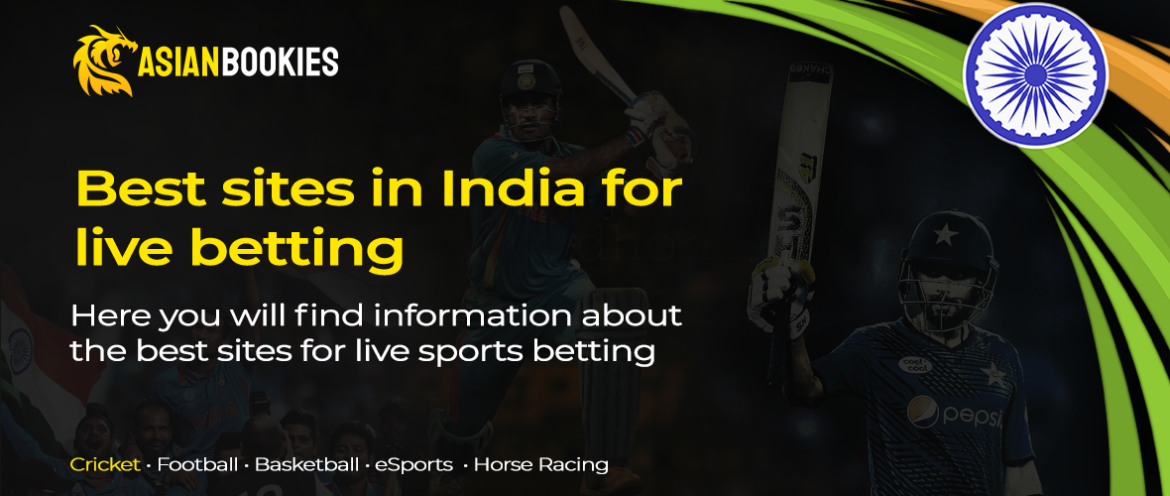
Live betting, with its adrenaline-pumping dynamism, demands real-time analytics, swift platforms, and instantaneous updates. Several top betting sites in India specialize in this aspect, elevating the in-play betting experience.
- 1xBet: A globally trusted name, 1xBet excels in live betting. Their platform is renowned for its swift updates, exhaustive real-time statistics, and an expansive market that keeps punters hooked even during live events.
- 20Bet: Known for its rapid withdrawal processes, 20Bet doesn’t disappoint when it comes to in-play betting either. Their intuitive interface combined with diverse in-game options ensures that Indian bettors have a seamless live betting journey.
- Sportsbet.io: Catering to those who prioritize safety and anonymity, Sportsbet.io also stands out for its live betting prowess. With real-time graphics, rapid odds updates, and an intuitive platform, it’s undoubtedly a top pick for Indian live bettors.
Which are the Indian bookmakers with the best casinos?
Bridging the gap between traditional betting and the allure of casino games, many best betting sites in India have introduced integrated casino platforms.
- Mostbet: Apart from offering the highest betting odds, Mostbet provides an eclectic mix of casino games. Their seamless blend of sports betting and casino gaming ensures that gamblers have a well-rounded experience.
- BC.game: A trailblazer in its own right, BC.game not only offers the best mobile betting app but also a blockchain-based casino platform. This modern twist, combined with a unique assortment of games, sets them apart.
- BetWinner: A preferred choice for horse racing bets, BetWinner also dazzles with its casino offerings. Featuring games from top-tier developers and a smooth interface, it promises a top-notch casino thrill for Indian players.
Comparison table of Betting sites in India
The myriad of options available for online betting in India can be a tad overwhelming. To simplify the selection process, we’ve compared the top 5 betting sites based on the most sought-after features by Indian bettors. These platforms have been chosen based on their overall appeal, user-friendly interface, and the value they offer to their users.
| Betting Site | Key Sports Offered | Live Betting | Banking Options | Bonus Offers | User Rating |
| CasinoIn | Cricket, Football, Horse Racing | Yes | Multiple local and global options | Competitive | ★★★★☆ |
| 1xBet | Cricket, Kabaddi, Football | Yes | Numerous local payment methods | High-value offers | ★★★★★ |
| 20Bet | Cricket, Horse Racing, Kabaddi | Yes | Wide variety, including cryptocurrency | Attractive | ★★★★☆ |
| MegaPari | Football, Cricket, Tennis | Yes | Diverse options, both local and global | Regular promotions | ★★★★☆ |
| Mostbet | Cricket, Football, Tennis | Yes | Multiple local payment methods | Consistent bonuses | ★★★☆☆ |
Each of these sites brings its unique flair to the table, ensuring that every bettor finds a platform that suits their style. Whether you prioritize diverse sports options, the thrill of live betting, or the availability of multiple banking methods, this table will guide you to the best betting site for your needs. With these platforms, punters can expect a premium betting experience, tailormade for the Indian market.
Check out other popular Asian and international banking methods for gambling and betting:
See more about Asian Bookmakers
How to register and start betting at top legal sites in India?
Navigating through the maze of betting platforms can be a daunting task, especially for newcomers. However, with the right guidance, initiating your betting journey can be both easy and rewarding. Here’s a structured guide to help you get started at the top betting sites in India:
- Selecting a Site from Our Rating: For a hassle-free betting experience, it’s advisable to choose bookmakers from our list. These platforms are meticulously vetted, ensuring they’re trustworthy and in compliance with local regulations. Our comprehensive ranking provides insights, making the selection process effortless.
- Go to the Site: With our user-friendly interface, getting to your chosen site is a breeze. By clicking on our direct links, you’ll be seamlessly redirected to the official website of the bookmaker, ensuring you’re on a legitimate platform.
- Registration: Once on the site, look for the ‘Sign Up’ or ‘Register’ button, typically located at the top corner. Fill in the required personal details. Some platforms might have a KYC (Know Your Customer) policy, necessitating identity verification. This step is crucial for ensuring secure transactions and withdrawing funds in the future.
- Deposit of Funds: After registration, you’ll be prompted to deposit funds. Choose your preferred method of payment, ranging from e-wallets, bank transfers, or even cryptocurrencies on some platforms. It’s paramount to familiarize yourself with bonus conditions at this stage. Often, bookmakers offer enticing bonuses, but it’s essential to understand their terms for claiming and wagering.
- Placing a Bet: With funds in your account, you’re all set. Navigate to your desired sport or event, select the odds, and specify your bet amount. Confirm your bet, and voilà, you’ve just placed your first bet!
How popular is mobile betting in India and what are the best betting apps in India?
The digital revolution has transformed several industries, and the gambling market is no exception. Mobile betting, particularly in India, has observed a substantial surge in recent times. According to recent studies, India is the second-largest market globally for smartphone users, with an estimated user base of over 500 million in 2021. This massive number, combined with the growing acceptance of online gambling, makes it clear why mobile betting is soaring in popularity.
Mobile apps from the best betting sites in India offer numerous benefits that cater to the contemporary needs of bettors. Firstly, they provide unparalleled convenience. Bettors can place their bets on the go, whether they’re commuting, waiting in a line, or relaxing at home. This flexibility has made it an attractive option for many, especially the younger demographic. Secondly, these apps often offer an optimized user experience, with features tailored for mobile screens, ensuring efficient navigation and user-friendly interfaces.
Moreover, the recent amendments in gambling laws have made it easier for bettors to engage without any legal hassles. The Public Gambling Act of 1867, initially stringent, has seen relaxations in recent years, especially when it comes to online platforms. The Federation of Indian Chambers of Commerce & Industry’s report highlighted how the online gambling market is projected to be worth $1.1 billion by 2024. A significant portion of this is attributed to mobile betting, underscoring its pivotal role in the industry’s future.
Considering the best bookmakers in India and their mobile offerings, here are the top 3 mobile apps that stand out:
- 1xBet App: A globally recognized brand, 1xBet offers a comprehensive app with an extensive range of betting markets. Its intuitive design ensures a seamless betting experience for both novices and seasoned bettors.
- BetWinner App: Prioritizing user experience, BetWinner’s mobile application is efficient and offers live streaming for certain sports events, enriching the live betting experience.
- 10Cric App: Tailored specifically for the Indian market, 10Cric offers localized betting options on popular sports like cricket. Its app is user-friendly and ensures quick transactions.
What bonuses are offered by legal betting sites in India?
In the fiercely competitive world of online betting, bonuses and promotions play a pivotal role in attracting and retaining players. For many bettors in India, the type and magnitude of the bonuses can often be a deciding factor in choosing a betting site. Not only do these bonuses enhance the overall betting experience, but they also provide bettors with an opportunity to maximize their returns. So, what kind of bonuses do the leading bookmakers in India offer, and how do they cater to different audiences?
There are various types of bonuses offered by bookies in India:
- Welcome Bonus: As the name suggests, this bonus is offered to new players upon registration. Typically, it matches a certain percentage of the player’s first deposit.
- Free Spins: These are predominantly for casino players and provide them with a certain number of free spins on selected slot games.
- Multi Bonus: This type of bonus rewards players for making multiple bets. It’s especially popular among seasoned bettors looking to capitalize on a series of events.
- Deposit Bonus: Players receive a bonus based on how much they deposit, up to a certain limit.
Each type of bonus caters to a different kind of player. For instance, welcome bonuses and free spins are often targeted at newcomers, giving them a taste of the platform. On the other hand, multi bonuses are designed for experienced bettors looking to leverage their expertise across multiple events.
However, it’s vital for players to read the terms and conditions associated with these bonuses. Wagering requirements, which dictate how many times the bonus amount needs to be bet before withdrawal, can vary among Indian betting sites. Some might have higher requirements, making it challenging to cash out bonus-related winnings.
Top 5 Bonus Offers for Indian Players:
- BC.Game: Offers a mammoth Sports 600% bonus up to ₹60,000. This is a perfect choice for those who are keen on diving deep into sports betting.
- Mostbet: Provides a 125% bonus up to ₹24,800, along with 250 free spins. This blend of a hefty bonus with free spins makes it an attractive option for both sports and casino enthusiasts.
- Cricv: A strong contender for cricket enthusiasts, Cricv offers a 100% bonus up to ₹50,000 on the first deposit, complemented with 50 free spins. This can be particularly appealing for those looking to place significant bets on cricket events.
- CasinoIn: Catering predominantly to the casino crowd, they offer a 100% welcome bonus up to ₹20,000. This can be a great starter pack for newcomers keen on exploring the casino realm.
- MegaPari: With a 100% Multi Bonus, MegaPari entices those bettors looking to place bets across various sports and events.
Payments in Indian betting: currencies, popular methods, security and anonymity
One of the primary concerns for bettors venturing into online gambling is the security and convenience of financial transactions. Ensuring the safety of your funds while betting is paramount, and understanding the best payment methods helps in navigating the world of online betting seamlessly. For this reason, the safest betting sites in India have incorporated a plethora of payment methods tailored to the local and international audience.
Which bookmakers accept Indian rupees?
Recognizing the potential and increasing demand in the Indian betting market, several top bookmakers now accept transactions in Indian rupees (INR). This is not only convenient for Indian players but also eradicates any losses that might occur due to currency conversion.
What are the deposit and withdrawal methods available at safe betting sites in India?
The Indian betting arena offers a diverse range of payment methods catering to the unique needs of each bettor. Always remember to prioritize security and choose methods that align with your convenience and betting strategy.
Bank and Card-Based Payments:
- Cards: Most of the India trusted online betting sites accept major debit and credit cards, including Visa and MasterCard.
- NetBanking: Direct online bank transfers are a popular method, ensuring real-time and secure transactions.
- IMPS (Immediate Payment Service): IMPS facilitates real-time bank-to-bank transfers. It’s quick, efficient, and highly secure.
Digital Wallets and eMoney:
Digital wallets, commonly known as e-wallets, have gained significant traction in recent years. They allow users to store funds, which they can transfer to online bookies seamlessly. Popular e-wallets include:
- Skrill
- NETELLER
- PayTM
- PhonePe
- MuchBetter
- EcoPayz
- AstroPay
Prepaid and Voucher-based Systems:
- Paysafecard: A prepaid online payment method based on vouchers with a 16-digit PIN code.
- RupeePay: Designed especially for the Indian market, it’s a voucher-based system that offers a high degree of anonymity.
Unified Payments Interface (UPI) Systems:
- UPI (Unified Payments Interface): A real-time payment system that facilitates inter-bank transactions by instantly transferring funds between two bank accounts on a mobile platform.
Crypto:
Cryptocurrencies, decentralized digital currencies, are now being accepted by some of the progressive betting sites. They offer a high level of anonymity and often have quick transaction times.
Check out other popular cryptocurrencies for betting:
Read more about Crypto Bookmakers
How to stay safe and anonymous when making payments for betting?
Safety and anonymity are crucial when indulging in online betting. Always choose platforms that utilize encryption technologies, ensuring your financial details remain private. Furthermore, using e-wallets or prepaid cards can add an extra layer of anonymity as they don’t require linking to your primary bank account.
Comparison of Payment Methods for Online Betting in India:
| Payment Method | Type | Transaction Limit | Transaction Time | Cash-out Time |
| Cards | Bank/Card-Based | Varies by Bank | Instant | 1-5 Days |
| NetBanking | Bank/Card-Based | Varies by Bank | Instant | 1-5 Days |
| IMPS | Bank/Card-Based | Varies by Bank | Instant | Within 24 Hours |
| Skrill | Digital Wallet | ₹500 – ₹2,50,000 | Instant | Within 24 Hours |
| NETELLER | Digital Wallet | ₹1,000 – ₹5,00,000 | Instant | Within 24 Hours |
| PayTM | Digital Wallet | ₹100 – ₹1,00,000 | Instant | Within 24 Hours |
| UPI | UPI System | Varies by Bank | Instant | Within 24 Hours |
| Paysafecard | Prepaid System | ₹100 – ₹10,000 | Instant | NA |
| Cryptocurrency | Digital Currency | No Limit | Instant to 1 Hour | Varies by Currency |
What are the most popular sports and betting markets in India?
India’s passion for sports is well-known worldwide, and this ardor extends to its burgeoning online betting landscape. There are several sports that captivate the Indian audience, both in terms of viewership and betting. While international sports like football have found their footing, traditional sports like cricket remain unchallenged in their dominion over the hearts and minds of sports enthusiasts. Let’s delve into the most popular sports that resonate with Indian bettors and the specific markets they prefer.
Cricket
Without a doubt, cricket reigns supreme when it comes to sports in India. Its popularity is such that it’s often referred to as a religion. From local gully cricket matches to international championships, the sport enjoys unparalleled viewership. Consequently, Indian bookmakers have made it a focal point, offering an extensive range of betting markets for cricket enthusiasts.
Leagues and Championships:
- Indian Premier League (IPL)
- ICC World Cup
- ICC T20 World Cup
- Big Bash League
Popular Types of Bets:
- Match Winner
- Top Batsman/Bowler
- Man of the Match
- Total Runs/Wickets
Football
Football, though historically overshadowed by cricket, has seen a surge in popularity in recent years. Clubs from the English Premier League (EPL) to Spain’s La Liga have amassed significant followings, especially among the younger generation. In addition, the advent of the Indian Super League (ISL) has further spurred interest in local football.
Leagues and Championships:
- Indian Super League (ISL)
- English Premier League (EPL)
- UEFA Champions League
- FIFA World Cup
Popular Types of Bets:
- Match Result
- Goals Over/Under
- First Goal Scorer
- Total Corners
Kabaddi
Kabaddi, a traditional Indian sport, has witnessed a renaissance of sorts, especially after the introduction of the Pro Kabaddi League. With matches characterized by high-intensity and drama, it’s become a favorite among local betting sites in India.
Leagues and Championships:
- Pro Kabaddi League (PKL)
Popular Types of Bets:
- Match Winner
- Top Raider
- Total Raid Points
- Successful Tackles
Horse Racing
Horse racing has a colonial legacy in India and continues to be a beloved sport, especially among the elite. Major cities host races, and many bookmakers in India facilitate bets for these events, making it a thriving betting market.
Popular Championships:
- Indian Derby
- Bangalore Turf Club Races
- Mysore Race Club Events
Popular Types of Bets:
- Winner of the Race
- Place Bets
- Show Bets
- Quinella and Trifecta Bets
TL:DR – Key Points on Online Betting in India
- Diverse Sporting Landscape: Cricket reigns supreme in India’s online betting ecosystem, but football, kabaddi, and horse racing also garner substantial attention on Indian local betting sites.
- Quality Platforms: It’s essential to opt for the best betting sites in India to ensure a rich user experience, especially on mobile devices, and to access a wide range of sports and betting markets.
- Lucrative Offers: Indian platforms frequently roll out attractive bonuses tailored for the local market. However, understanding the terms and conditions of these offers is crucial.
- Multiple Payment Avenues: From traditional banking to e-wallets and cryptocurrencies, there’s a wealth of payment methods available. Always prioritize using legal betting sites in India to guarantee financial safety and transactional integrity.
- Safety and Legality: With the complexities of India’s gambling laws, sticking to licensed and legal platforms is the best way to ensure a secure betting experience.
Check out our ranking of Overseas Betting Sites for Anonymous and Unlimited Bets.
If you would like to bet anonymously without any tax or regulatory restrictions, check out our bettor rating below
Conclusion
In the rapidly evolving world of online sports betting, India has marked its unique footprint. The allure of cricket, complemented by other sports like football and kabaddi, has fueled an unprecedented surge in online betting activities. Key indian bookmakers have taken strides in catering to this budding market, offering tailored bonuses, diverse betting markets, and top-notch platforms. Opting for local betting sites in India ensures not only a culturally curated betting experience but also ensures adherence to regional laws and preferences. As the world of online betting continues to evolve, India’s passionate sports enthusiasts now have a wealth of reputable, legal, and rewarding platforms at their fingertips, emphasizing a promising future for online betting in the nation.
FAQs about Betting Sites in India.
Yes, online betting is a grey area in India. While the Public Gambling Act of 1867 prohibits running or being in charge of a public gaming house, there’s no specific law against online betting.
The indian local betting sites operating within the country’s jurisdiction aren’t explicitly legal, but offshore sites that cater to Indian players, like CasinoIn and 1xBet, function within a legal framework.
Most legal betting sites in India offer multiple deposit methods, including bank transfers, e-wallets, and cryptocurrencies. Always ensure the chosen platform is trustworthy before making any deposits.
While the legality of online betting remains ambiguous, no specific law criminalizes individual players for betting online. Still, always choose reputable and legal betting sites in India to ensure safety.
Several best betting sites in India are popular, with CasinoIn, 1xBet, and 20Bet being among the top choices based on features, security, and user experience.
Upon signing up and making a first deposit on many betting platforms, the welcome bonus is typically credited. However, always read the terms and conditions for bonus eligibility.
Yes, many international betting sites accept Indian players, and since they operate offshore, they remain within a legal boundary.
A good betting site offers a wide range of sports markets, robust security measures, user-friendly interface, prompt customer support, and attractive bonuses.
Cricket remains the most popular sport, followed by football, kabaddi, and horse racing.
Betting sites offer various bonuses like welcome bonuses, deposit match bonuses, free bets, and cashback offers to attract and retain players.
Yes, most top and reputable betting sites catering to the Indian market accept payments in rupees, ensuring convenience for Indian players.
Read this page in other languages:


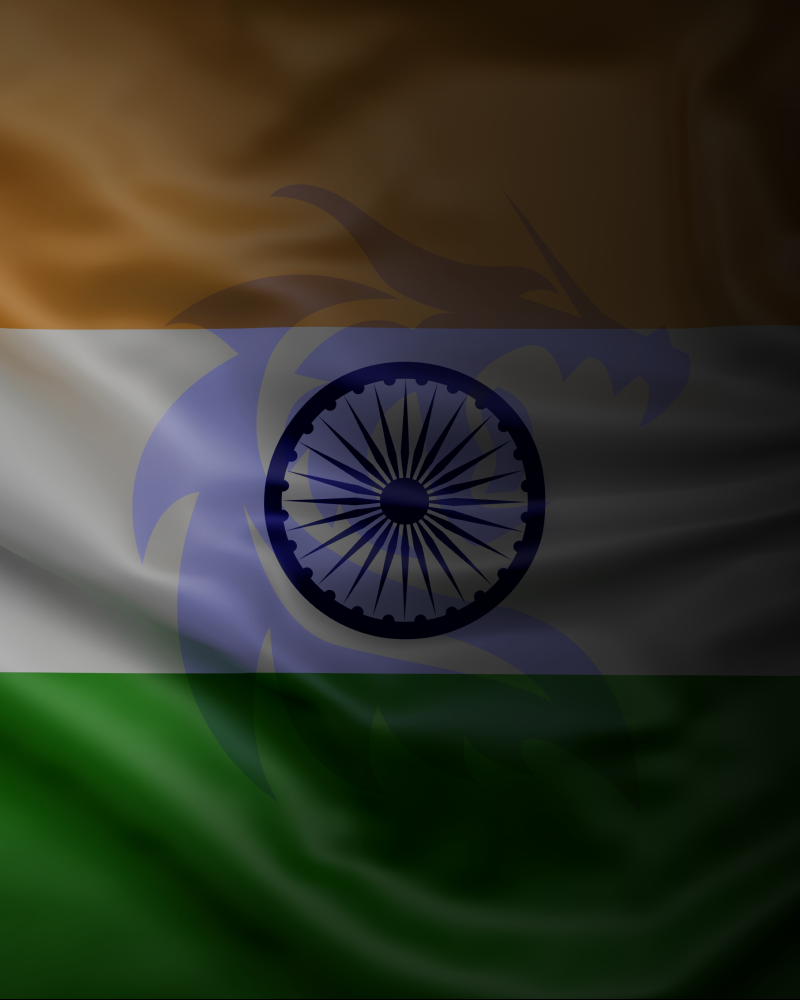






















Your review has been sent for moderation